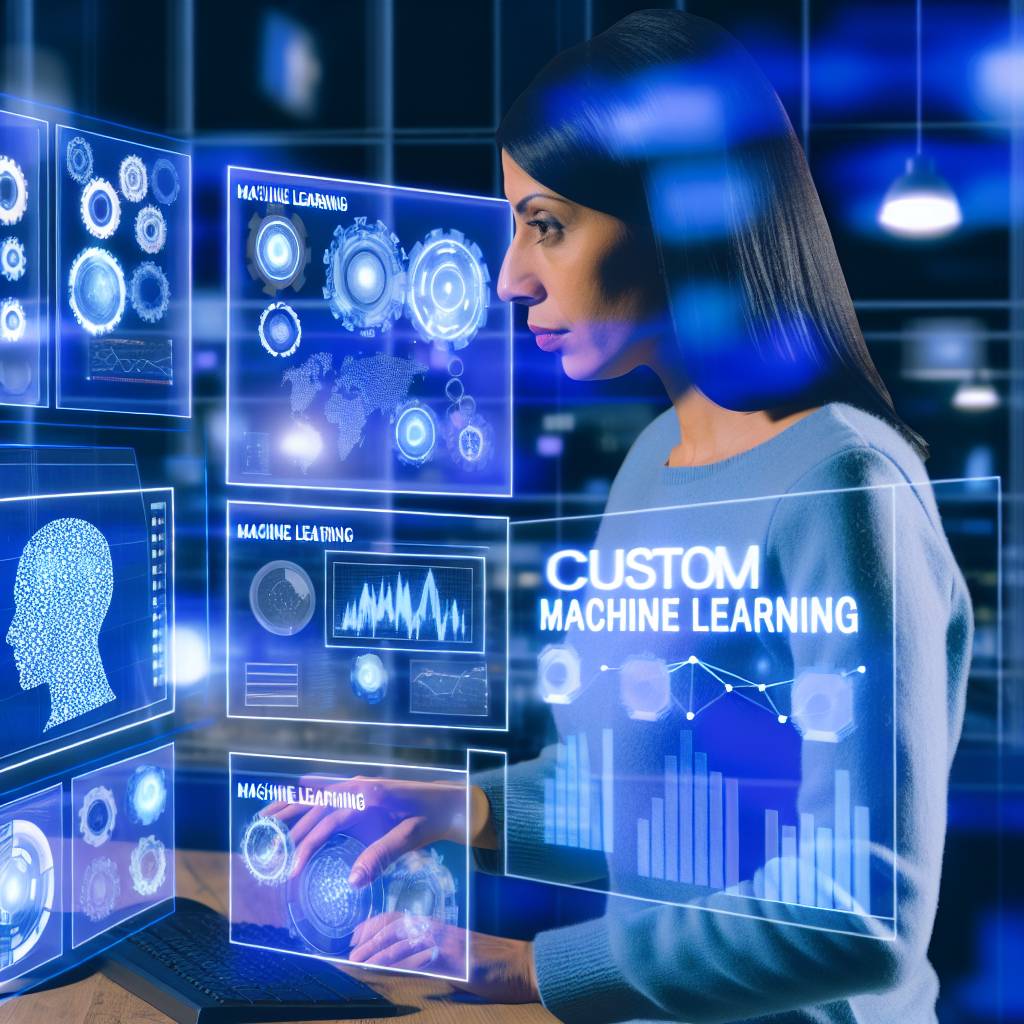Introduction
Overview of the changing landscape of talent acquisition
The landscape of talent acquisition is rapidly changing.
Employers face fierce competition for skilled candidates.
Traditional recruitment methods often fall short in this fast-paced environment.
Companies now seek innovative solutions to streamline their hiring processes.
AI and its significance in modern recruitment
Artificial Intelligence (AI) has emerged as a game-changer in recruitment.
By harnessing the power of AI, organizations can enhance their hiring strategies.
AI technologies automate routine tasks, reduce bias, and improve candidate engagement.
They analyze vast amounts of data quickly to unveil insights about potential hires.
AI-powered applicant tracking systems (ATS) are at the forefront of this transformation.
These systems revolutionize how organizations identify and attract talent.
They assist recruiters in sifting through hundreds of applications with unparalleled efficiency.
Additionally, ATS can rank candidates based on their qualifications and alignment with job requirements.
Purpose of the blog: to explore how AI-powered applicant tracking systems (ATS) are revolutionizing the recruitment process
The purpose of this blog is to explore the significant impact of AI-driven ATS in recruitment.
Modern recruitment faces challenges such as high applicant volumes and time constraints.
AI solutions help recruiters focus on strategic decision-making instead of mundane tasks.
Moreover, AI can identify patterns in candidate data, aiding in the prediction of future hiring needs.
Recruiters gain valuable insights into candidate behaviors and preferences through data analysis.
The ability to personalize the candidate experience is another critical advantage of AI-driven systems.
Furthermore, bias mitigation becomes more accessible with AI.
These systems help create a level playing field by focusing solely on qualifications and skills.
By ensuring diverse candidate pipelines, organizations can foster innovation and creativity.
As we delve deeper into the realm of AI-powered ATS, we will uncover their features and benefits.
These systems not only make recruitment faster but also more effective.
Embracing AI in talent acquisition is no longer just an option; it is an imperative for success.
Understanding Applicant Tracking Systems (ATS)
Definition of Applicant Tracking Systems
An Applicant Tracking System (ATS) is a software application that automates the hiring process.
It streamlines the recruitment process for employers, manages applicant data, and helps identify top candidates.
With an ATS, companies can collect, sort, and filter resumes in a centralized location.
This technology saves time, reduces bias, and improves the quality of hires.
Historical Context: Evolution from Manual Processes to Digital Solutions
The recruitment landscape has drastically changed over the years.
In the pre-digital era, companies primarily used manual methods to process job applications.
Recruiters relied on paper resumes, filing cabinets, and tedious sorting methods.
The introduction of personal computers in the late 20th century marked the beginning of digital recruitment.
Early software solutions allowed for basic electronic storage of applications.
As the internet became more prevalent, job boards emerged.
Companies began posting job openings online, attracting a larger candidate pool.
We Design & Develop Websites, Android & iOS Apps
Looking to transform your digital presence? We specialize in creating stunning websites and powerful mobile apps for Android and iOS. Let us bring your vision to life with innovative, tailored solutions!
Get Started TodayHowever, this influx of resumes created challenges for recruiters.
The volume of applications became overwhelming, leading to the need for more sophisticated solutions.
Thus, ATS technology began to evolve, integrating automation and data management features.
In the 2000s, ATS solutions became more mainstream.
Vendors began offering better functionality, including resume parsing and candidate scoring.
Systems integrated with job boards, allowing seamless job posting and application processing.
As a result, companies could process thousands of applications efficiently.
This shift marked a significant turning point in talent acquisition.
Importance of ATS in Managing the Recruitment Pipeline and Candidate Data
The efficiency of an Applicant Tracking System (ATS) significantly impacts the talent acquisition process.
Here’s a closer look at its importance:
- Centralized Database: An ATS keeps all candidate information in one place.
- Streamlined Applications: Candidates can apply for jobs easily, ensuring a positive user experience.
- Automated Sorting: The ATS uses algorithms to sort resumes based on job criteria.
- Collaboration Tools: Recruiters collaborate with hiring teams seamlessly.
- Analytics and Reporting: The ATS provides data-driven insights for recruitment strategies.
- Time Savings: Automation of repetitive tasks allows recruiters to focus on high-value activities.
- Candidate Communication: Automated emails and notifications keep candidates informed about their application status.
- Enhanced Candidate Experience: A streamlined process leads to better candidate satisfaction.
- Pre-screening Capabilities: The ATS filters out unqualified candidates early in the process.
- Integration with Other Tools: The ATS connects with HR tools, job boards, and social media platforms.
The ATS transforms recruitment, helping organizations adapt to new hiring challenges.
During talent shortages, it analyzes applicant data to identify the best fit.
As remote work rises, ATS discovers talent regardless of geography.
The shift from manual processes to digital ATS solutions revolutionizes talent acquisition.
An ATS enables recruiters to manage the entire hiring pipeline effectively.
It fosters a data-driven approach, allowing companies to make informed hiring decisions.
Maintaining organized candidate data is crucial.
An ATS provides clarity and structure, allowing quick access to information.
Understanding ATS is vital for modern recruitment.
Read: Revolutionizing Content Creation with AI-Driven Voice Transcription
The Role of AI in Applicant Tracking Systems
Artificial Intelligence (AI) is transforming various industries, and talent acquisition is no exception.
Many companies are adopting AI-powered applicant tracking systems (ATS) to enhance their hiring processes.
These systems use various AI technologies, such as machine learning and natural language processing (NLP).
Together, these technologies help recruiters become more efficient and effective in their search for top talent.
Technologies Used in AI-Powered ATS
Several AI technologies play a crucial role in modern applicant tracking systems.
Understanding these technologies helps organizations leverage their capabilities to streamline hiring.
- Machine Learning: Machine learning algorithms analyze large datasets. These algorithms improve over time, providing more accurate insights into candidate evaluations.
- Natural Language Processing: NLP enables systems to understand human language. It helps parse resumes and match job descriptions with candidate profiles.
- Predictive Analytics: This technology helps forecast hiring needs based on data trends. Companies can make data-driven decisions for future hiring.
Enhancing Traditional ATS Functionalities
AI enhances standard ATS functionalities, transforming how organizations approach recruitment.
The integration of AI leads to more efficient processes and improved outcomes.
Resume Parsing
One of the most significant advancements in ATS capabilities comes from AI-powered resume parsing.
Traditional resume parsing often fails to accurately capture essential candidate details.
AI algorithms analyze resumes in-depth, extracting key information effectively.
This technology helps identify relevant skills, work history, and qualifications.
- Improved Accuracy: AI algorithms significantly improve resume accuracy. They analyze context and semantics, reducing errors in data extraction.
- Customizable Parsing: Companies can customize parsing criteria based on job requirements. This ensures that only the most relevant candidates are considered.
- Integration with Job Descriptions: AI can match resumes with job descriptions more effectively. This leads to a more refined shortlist of candidates.
Candidate Screening
Another area where AI shines is in candidate screening.
Traditional screening methods often involve manual reviews of applications, which can be time-consuming and prone to bias.
AI automates the screening process, resulting in significant time savings.
We Design & Develop Websites, Android & iOS Apps
Looking to transform your digital presence? We specialize in creating stunning websites and powerful mobile apps for Android and iOS. Let us bring your vision to life with innovative, tailored solutions!
Get Started Today- Bias Reduction: AI systems can be designed to minimize unconscious biases. They focus purely on qualifications rather than demographic factors.
- Ranking Candidates: AI utilizes algorithms to rank candidates based on their fit. This helps recruiters focus on the most suitable applicants.
- Skill Assessment: AI can evaluate skills through online assessments. Candidates can be scored based on their performance, ensuring a fair evaluation.
Interview Scheduling
Interview scheduling often poses logistical challenges for HR teams.
Coordinating between multiple candidates and interviewers can lead to scheduling conflicts.
AI automates this process, reducing the administrative burden on recruiters.
- Smart Scheduling: AI systems analyze participants’ calendars and availability. They suggest optimal time slots for interviews, saving time and effort.
- Automated Reminders: AI tools can send automated reminders to both candidates and interviewers. This reduces the chances of missed appointments.
- Candidate Communication: These systems provide seamless communication channels. They facilitate updates and queries effortlessly for both parties.
Benefits of AI in ATS
The benefits of adopting AI in applicant tracking systems extend beyond improved functionalities.
Organizations that embrace AI technologies often see significant advantages in their hiring processes.
- Time Efficiency: AI speeds up the recruitment process dramatically. Organizations can move from resume submission to interviews faster than ever.
- Cost-Effectiveness: Automating processes with AI reduces reliance on external recruiters. This can lead to lower overall hiring costs.
- Improved Candidate Experience: Candidates appreciate quick feedback and streamlined processes. This enhances their overall experience and perception of the employer brand.
- Data-Driven Decisions: AI provides valuable insights through data analytics. HR teams can adjust their strategies based on measurable results.
- Scalability: AI-powered ATS can easily scale with the organization. Companies can adapt the system according to their hiring needs without extensive manual adjustments.
Challenges and Considerations
While the role of AI in applicant tracking systems offers various benefits, some challenges also exist.
Organizations must navigate these issues to fully benefit from AI technologies.
- Data Privacy: Handling large volumes of candidate data raises privacy concerns. Companies must understand legal requirements and regulations.
- Bias in AI Models: AI models can inadvertently perpetuate biases present in training data. Companies should regularly audit their systems for fairness and equity.
- Integration Issues: Implementing AI technologies can lead to integration challenges with existing systems. A well-planned approach helps mitigate these issues.
- User Adoption: HR teams may resist adopting AI technologies. Effective training and clear communication can encourage user adoption.
The integration of AI in applicant tracking systems is revolutionizing talent acquisition.
From resume parsing to interview scheduling, AI enhances every aspect of the recruitment process.
Forward-thinking organizations that embrace AI stand to gain a competitive advantage in attracting and retaining top talent.
As technology continues to evolve, the role of AI in recruitment will undoubtedly expand, offering further opportunities for innovation and efficiency in the hiring landscape.
Read: AI-Powered Learning Assistants: Revolutionizing Knowledge Acquisition
Benefits of AI-Powered ATS for Recruiters
In today’s competitive landscape, companies continuously seek ways to optimize their recruitment processes.
An AI-powered applicant tracking system (ATS) stands at the forefront of this evolution.
These systems leverage advanced technology to streamline hiring while addressing common challenges faced by recruiters.
Increased Efficiency in the Recruitment Process
One of the primary advantages of AI-powered ATS solutions is their ability to enhance recruitment efficiency.
Traditional hiring methods often involve sifting through countless resumes manually.
This approach is not only time-consuming but also prone to errors.
AI-powered ATS automates several time-consuming tasks, such as:
- Resume Screening: AI can quickly scan resumes to identify essential qualifications and keywords, filtering out unqualified candidates.
- Scheduling Interviews: Many systems can automatically schedule interviews, reducing back-and-forth communication between interviewers and candidates.
- Response Management: AI can send automatic responses to applicants, keeping them informed throughout the selection process.
- Data Analysis: AI can analyze recruitment metrics, identifying trends and areas for improvement without human intervention.
With these automated processes, recruiters save hours previously spent on administrative tasks.
This newfound efficiency allows them to focus on what truly matters: engaging with candidates and making informed hiring decisions.
Reduction of Bias in Candidate Selection
Fairness and equity in recruitment are critical to fostering diverse workplaces.
AI-powered ATS plays a vital role in minimizing bias within the selection process.
Traditional hiring often hinges on subjective judgments, which can introduce unconscious bias.
AI systems help to mitigate this bias in several noteworthy ways:
- Standardized Criteria: AI applies consistent criteria when evaluating resumes, ensuring all candidates are assessed equally.
- Anonymized Applications: Some ATS can obscure details such as name or address, further reducing the potential for bias.
- Data-Driven Decisions: Recruiters receive data-backed insights, enabling them to focus on skills and experience rather than personal characteristics.
With these features, AI-powered ATS solutions promote a more inclusive hiring process.
Organizations benefit from diverse talent pools, leading to greater innovation and better team dynamics.
Enhanced Ability to Identify Top Talent Quickly
In the war for talent, the ability to identify top candidates quickly is paramount.
AI-driven ATS solutions empower recruiters with advanced tools to pinpoint the best applicants within minutes.
Some key capabilities that boost this ability include:
- Advanced Search Filters: Recruiters can utilize AI to filter candidates by specific skills, experience, and qualifications.
- Predictive Analytics: AI assesses past hiring data to predict which candidates are most likely to succeed in particular roles.
- Smart Ranking: AI algorithms can rank candidates based on qualifications and predicted performance, streamlining the selection process.
By quickly identifying the most qualified candidates, recruiters can fill positions faster, reducing time-to-hire and improving overall efficiency.
Enhanced talent identification ultimately contributes to better business outcomes.
Features That Simplify Collaboration Among Hiring Teams
Collaboration among hiring teams is crucial for making informed recruitment decisions.
AI-powered ATS enhances this collaboration by providing tools that facilitate seamless communication and sharing of insights.
Notable features that support team collaboration include:
We Design & Develop Websites, Android & iOS Apps
Looking to transform your digital presence? We specialize in creating stunning websites and powerful mobile apps for Android and iOS. Let us bring your vision to life with innovative, tailored solutions!
Get Started Today- Centralized Candidate Database: All team members can access candidate information in one location, fostering transparency.
- Real-Time Feedback: Recruiters can provide instant feedback on candidates, enabling dynamic discussions about qualifications.
- Shared Scorecards: Teams can develop standardized scorecards for evaluating candidates, ensuring everyone is aligned on selection criteria.
- Integration with Collaboration Tools: Many ATS can integrate with platforms like Slack or Microsoft Teams, streamlining communication.
By enabling a collaborative environment, AI-powered ATS ensures that hiring managers and talent acquisition teams work together effectively.
This unified approach leads to better-informed hiring decisions, ultimately benefiting the organization.
In summary, the adoption of AI-powered applicant tracking systems marks a significant shift in talent acquisition.
Increased efficiency, reduction of bias, enhanced talent identification, and improved collaboration redefine the recruitment landscape.
Organizations leveraging these advanced technologies will position themselves to attract and retain the best talent in an ever-competitive market.
Read: Revolutionize PDF Marketing with Custom Flipbook Integration Tools

Impact on Candidate Experience
The candidate experience significantly influences the success of talent acquisition strategies.
In this digital age, AI-powered applicant tracking systems (ATS) offer transformative solutions to shape this experience.
Here, we explore how AI can bolster candidate communication, automate updates, and streamline application processes.
Personalized Interaction: How AI Can Improve Communication with Candidates
Gone are the days of generic communications.
AI enables recruiters to create personalized interactions.
This technology analyzes candidate profiles and engagement history to tailor messages.
The following aspects illustrate how AI enhances individual communication:
- Customized Messaging: AI analyzes candidate responses and preferences to send relevant messages. This increases candidates’ engagement levels.
- Behavioral Insights: By evaluating behavioral patterns, AI sends outreach that resonates with candidates’ career aspirations.
- Personalized Follow-Ups: AI can automatically trigger follow-up emails based on application stages, ensuring candidates feel valued.
- 24/7 Availability: AI chatbots provide instant responses to candidate inquiries. This enhances communication timelines and candidate satisfaction.
- Interactive Engagement: Candidates can engage in conversations with AI tools, receiving instant feedback or information regarding roles.
As a result, personalized interaction through AI fosters a more positive and engaging candidate experience.
Candidates appreciate timely and relevant communications, increasing their likelihood of remaining engaged throughout the application process.
This leads to a stronger employer brand and improved recruitment outcomes.
Automation of Updates and Feedback Loops
Timely updates are vital for keeping candidates informed.
AI streamlines communication by automating updates and feedback loops.
This automation removes the burden from recruiters, allowing them to focus on high-value tasks.
Here’s how it works:
- Automated Status Updates: Candidates receive real-time status updates on their applications. This reduces uncertainty and anxiety during the hiring process.
- Instant Feedback: AI systems can analyze interviews and evaluations, delivering prompt feedback to candidates, whether they progress or not.
- Engagement Metrics: AI measures candidate engagement throughout the application process, alerting recruiters about potential drop-off points.
- Surveys and Feedback Collection: Automatically gathering candidate feedback post-process helps improve future experiences.
- Data-Driven Insights: Analyzing feedback data enables organizations to refine their hiring processes continually.
This automation enhances transparency and reduces the communication gap between candidates and recruiters.
Candidates appreciate receiving updates, leading to improved satisfaction rates.
Furthermore, quick feedback helps candidates understand their performance, paving the way for growth and development.
Streamlined Application Processes Leading to Higher Candidate Satisfaction
A streamlined application process is essential to cultivate a positive candidate experience.
AI drastically simplifies this process, resulting in higher satisfaction among applicants.
The effects of AI in streamlining application processes include:
- Seamless Application Submission: AI-enabled systems make submitting applications quick and effortless for candidates.
- Elimination of Redundant Questions: AI identifies repeated queries in applications, allowing organizations to filter them out for a smoother experience.
- Intelligent Screening: AI efficiently screens applications, ensuring only the most qualified candidates proceed, thus saving time and effort for everyone involved.
- Responsive Mobile Platforms: AI enhances mobile-friendly interfaces, allowing candidates to apply and communicate from anywhere at any time.
- Calendar Sync Capabilities: AI integrates with calendar applications to schedule interviews automatically, making the process more efficient for both parties.
Through these improvements, candidates experience less friction in their application journey.
The more straightforward and efficient the process, the higher the likelihood candidates will remain engaged and satisfied.
The impact of AI on the candidate experience within talent acquisition is profound.
Personalized interaction fosters stronger communication between candidates and recruiters.
Automation of updates ensures candidates stay informed and connected throughout the hiring journey.
Streamlining application processes leads to heightened candidate satisfaction, ultimately improving employer branding.
Companies embracing AI in their recruitment practices not only enhance the candidate experience but also position themselves as forward-thinking employers.
As the job market evolves, organizations must adapt to these advancements.
Investing in AI-driven tools is no longer an option; it’s a necessity for creating an outstanding candidate experience.
We Design & Develop Websites, Android & iOS Apps
Looking to transform your digital presence? We specialize in creating stunning websites and powerful mobile apps for Android and iOS. Let us bring your vision to life with innovative, tailored solutions!
Get Started TodayBy prioritizing these areas, companies can attract and retain top talent in an increasingly competitive landscape.
Read: Automated Review Outreach: Boost Sales and Build Online Reputation
Challenges and Ethical Considerations
The incorporation of AI in recruitment has changed how organizations approach talent acquisition.
However, this shift towards automation also presents certain challenges and ethical considerations.
Addressing these issues is vital for creating a fair and effective recruitment process.
Potential Biases Ingrained in AI Algorithms
One of the most pressing concerns regarding AI in recruitment is the potential for biases.
These biases often stem from historical data and existing stereotypes.
When AI systems are trained on biased data, they tend to perpetuate these biases in their decision-making processes.
- Historical Bias: Many AI models rely on past hiring data. If this data reflects discriminatory practices, the AI may favor particular demographics over others.
- Representation Bias: If certain groups are underrepresented in the training dataset, the AI may overlook qualified candidates from these groups.
- Feedback Loop Bias: If AI consistently chooses similar profiles, it can create a cycle that reinforces existing biases.
To mitigate these challenges, organizations should carefully review the data used to train their AI models.
The Importance of Transparency in AI Decision-Making
Transparency is crucial for building trust in AI-driven recruitment processes.
Candidates deserve to understand how decisions are made regarding their applications.
Lack of transparency can lead to skepticism and distrust among applicants.
- Clear Criteria: Organizations must explain the criteria that AI systems use to evaluate candidates. This clarity helps candidates understand where they stand in the hiring process.
- Open Algorithms: Whenever possible, organizations should provide insights into the algorithms they use. This behavioral transparency allows for better scrutiny and accountability.
- Communication with Candidates: Regular updates and clear communication can keep candidates informed about their application status. This practice fosters a sense of engagement and respect.
Transparency not only enhances trust but also encourages organizations to remain accountable for their hiring decisions.
Strategies for Mitigating Risks Associated with AI in Recruitment
Implementing AI in recruitment offers significant advantages but also incurs risks.
Organizations must proactively mitigate these risks to ensure a fair hiring process.
Key Strategies for Ethical AI Use:
- Regular Audits: Conduct audits of AI systems to identify and address potential biases. Review training data and algorithmic outcomes.
- Inclusive Data Practices: Strive for inclusivity when gathering data for training AI models. Diverse representation in training datasets minimizes bias.
- Human Oversight: Implement human oversight in the AI decision-making process. Recruiters should exercise judgment based on their expertise.
- Ongoing Training: Provide ongoing training for teams on ethical AI practices. This education fosters awareness and promotes responsible technology use.
- Candidate Feedback Mechanism: Create channels for candidates to provide feedback about the recruitment process. This feedback is valuable for continual improvement.
- Collaboration with AI Experts: Engage data scientists and AI ethics experts to navigate complexities. These collaborations ensure compliance with ethical standards.
As firms embrace AI, they must champion transparency and prioritize fairness.
The integration of AI into recruitment processes is beneficial.
However, organizations must remain vigilant in identifying risks associated with bias.
By promoting fair practices, organizations can leverage AI while maintaining a positive candidate experience.
Prioritizing ethical considerations allows AI to empower rather than introduce bias.
Through continuous improvement, organizations can create equitable recruitment systems that reflect workforce diversity.
Case Studies: Successful Implementations of AI ATS
In recent years, organizations have increasingly adopted Artificial Intelligence (AI)-powered Applicant
Tracking Systems (ATS) to streamline their recruitment processes.
Several case studies highlight successful implementations of these systems, showcasing tangible improvements across various metrics.
This section looks at notable organizations that have embraced AI ATS methodologies and the positive outcomes they experienced.
Examples of Organizations that Adopted AI-Powered ATS
Mastercard
Tech Innovators Inc.
This company is a leading software development firm with a high volume of applications.
They implemented an AI ATS to enhance their candidate sourcing and screening process.
Using machine learning algorithms, they filter resumes more efficiently, matching key skills and experiences to the job descriptions.
Electrolux
Global Retail Solutions A major retail chain that requires a large seasonal workforce invested in an AI-powered ATS.
This platform allows them to manage thousands of applications swiftly.
It automates the screening process and prioritizes candidates who match the company’s culture and values.
Kuehne+Nagel
Financial Group Advisory This financial services firm utilized AI ATS to refine their selection process significantly.
They integrated the system with their existing HR infrastructure to streamline applicant assessments.
We Design & Develop Websites, Android & iOS Apps
Looking to transform your digital presence? We specialize in creating stunning websites and powerful mobile apps for Android and iOS. Let us bring your vision to life with innovative, tailored solutions!
Get Started TodayThe AI system also analyzes patterns in successful applicants, enabling data-driven recruitment strategies.
Bon Secours Mercy Health
Healthcare Solutions Corp. A prominent healthcare provider recognized the need for a quick and effective recruitment process.
Their AI ATS helped screen medical professionals efficiently.
By leveraging predictive analytics, the system identified candidates most likely to succeed in high-pressure healthcare roles.
Brother International Corporation
Education Sector United This organization aimed to attract top educational talent using an AI ATS tailored for teachers and education administrators.
The system emphasized aligning candidates with the organization’s mission and educational philosophy, thus raising the quality of recruits.
Metrics Showcasing Improvements in Recruitment Outcomes
Implementing an AI-powered ATS leads to several measurable improvements in talent acquisition.
The metrics below underscore the systems’ effectiveness in various organizations.
Time to Hire
- Mastercard: Reduced their time to hire from 45 days to 28 days.
- Electrolux: Achieved a 50% reduction in time to hire during peak recruitment seasons.
- Kuehne+Nagel: Streamlined their hiring process to ensure a 35% faster time to offer.
- Bon Secours Mercy Health: Managed to cut their standard hiring time from 30 days to 15 days.
- Brother International Corporation: Earned a 40% increase in hiring speed for teaching positions.
Quality of Candidates
- Mastercard: Experienced a 25% increase in candidate quality metrics post-implementation.
- Electrolux: Noted a 30% improvement in the retention rate of new hires after adopting the AI ATS.
- Kuehne+Nagel: Found that candidates sourced through the AI ATS were 20% more likely to receive positive performance reviews.
- Bon Secours Mercy Health: Reported a significant increase in candidate satisfaction scores, reaching up to 85%.
- Brother International Corporation: Improved alignment between new hires and organizational values by 30%.
Overall Recruitment Outcomes
- Mastercard: Increased the overall efficiency of the recruitment process by 40%.
- Electrolux: Realized cost savings of $100,000 in their annual recruitment budget.
- Kuehne+Nagel: Registered a 50% reduction in the number of interviews necessary to fill open positions.
- Bon Secours Mercy Health: Improved the diversity of their candidate pool by employing AI-driven sourcing strategies.
- Brother International Corporation: Enhanced their employer brand remarkably, leading to an increase in unsolicited applications by 20%.
The incorporation of AI-powered Applicant Tracking Systems has revolutionized talent acquisition for numerous organizations.
Companies Mastercard, Electrolux, Kuehne+Nagel, Bon Secours Mercy Health, and Brother International Corporation showcase diverse success stories that underline the systems’ potential.
As organizations continue to evolve in a competitive labor market, AI ATS will likely play a pivotal role.
These case studies not only affirm that AI technologies enhance recruitment processes but also underscore their importance in improving hiring outcomes.
As the landscape shifts towards data-driven decision-making, organizations leveraging AI ATS tools will likely remain at the forefront of attracting top talent.
Future Trends in AI-Driven Talent Acquisition
AI technology continues to drive profound changes in the talent acquisition landscape.
As organizations seek efficiencies and better hiring outcomes, it is crucial to understand the future trajectory of AI in applicant tracking.
Predictions on the Evolution of AI in Applicant Tracking
AI will reshape the recruitment process in multiple ways.
Many experts predict that the following key advancements will emerge in the coming years:
- Enhanced Candidate Matching: AI algorithms will evolve to offer more sophisticated candidate matching capabilities.
These systems will analyze resumes, social media profiles, and other data sources to find the best fits for available positions. - Natural Language Processing (NLP): As NLP technology improves, recruiters will utilize AI to streamline communications.
AI tools will automatically parse resumes, recognize skills, and assess context better than ever. - Predictive Analytics: Organizations will leverage predictive analytics to anticipate hiring needs. These tools will analyze historical hiring data to forecast trends, aiding more strategic workforce planning.
- Automated Interviewing: AI-driven platforms will automate initial candidate screenings. This trend allows recruiters to focus on high-value tasks, ultimately increasing efficiency.
- Personalized Candidate Experiences: AI will enable organizations to create personalized experiences for candidates.
From tailored job recommendations to customized communication, candidates will feel valued and engaged throughout the hiring process.
Emerging Technologies That May Impact Recruitment
The recruitment landscape will not solely rely on AI advancements.
Other emerging technologies will also play a vital role in shaping talent acquisition:
- Blockchain: Blockchain technology will increase transparency in the recruitment process. Recruiters can verify credentials and work histories with increased security and reduced fraud.
- Virtual Reality (VR) and Augmented Reality (AR): VR and AR technologies will enhance candidate experiences.
Organizations may use these tools for immersive job previews or realistic training simulations. - Biometric Screening: Emerging biometric technologies will assess candidate fitness for specific roles.
This information could include personality traits, learning styles, or cognitive abilities, aligning hires with organizational culture. - Chatbots: Intelligent chatbots will handle initial candidate inquiries effectively.
They provide round-the-clock support, enhancing the applicant experience while offloading routine tasks from human resources (HR) teams. - Workforce Analytics: Advanced analytics will offer deeper insights into employee performance and behaviors.
This data will empower HR teams to make data-backed decisions regarding talent acquisition strategies.
The Role of Human Judgment in a Technology-Driven Recruitment Process
While AI is revolutionizing talent acquisition, human judgment remains essential.
AI tools can gather and analyze extensive data, but human intuition and understanding cannot be overlooked.
Here are several reasons why:
- Cultural Fit: Human recruiters can assess whether candidates align with an organization’s culture. This subjective evaluation is critical to long-term employee success.
- Interpersonal Skills: Candidates often display their true potential during interviews. Human evaluators can gauge social cues and communication skills that AI might miss.
- Complex Decision-Making: In complicated scenarios, human judgment is crucial. Recruiters face nuanced situations requiring empathy, understanding, and ethical considerations.
- Relationship Building: Recruiters must foster relationships. These connections enhance candidate experiences and promote employer branding, which technology alone cannot replicate.
- Overcoming Bias: AI systems can inadvertently reinforce biases present in their training data. Human oversight ensures fair and equitable recruitment processes.
In summary, the future of AI-driven talent acquisition appears promising and transformative.
The integration of AI into applicant tracking systems will continue to grow, providing enhanced matching, sophisticated analytics, and personalized experiences.
Meanwhile, the emergence of technologies like blockchain, VR, and intelligent chatbots will further streamline recruitment processes.
However, recruiters must always remember the invaluable role of human judgment.
Finding the right balance between technology and personal touch is essential for success in the evolving talent acquisition landscape.
Organizations must embrace these innovations while ensuring that human evaluators remain central to hiring decisions.
Only then can they fully realize the potential of AI in recruitment.
Conclusion
Recap of the transformative effects of AI on talent acquisition
Artificial intelligence significantly transforms talent acquisition.
AI-powered Applicant Tracking Systems streamline recruitment processes and enhance decision-making.
Recruiters now process applications more efficiently than ever before.
Automated screening saves time by filtering out unqualified candidates.
This allows HR teams to focus on the most promising applicants.
Furthermore, AI improves candidate experience by providing instant feedback and updates.
We Design & Develop Websites, Android & iOS Apps
Looking to transform your digital presence? We specialize in creating stunning websites and powerful mobile apps for Android and iOS. Let us bring your vision to life with innovative, tailored solutions!
Get Started TodayJob seekers appreciate personalized communication, which fosters a positive impression of the hiring organization.
AI’s ability to analyze vast data sets also leads to better talent matching.
This ensures that candidates align with company culture and job requirements.
Final thoughts on balancing technology with the human touch in recruitment
However, it’s essential to balance technology and the human touch.
While AI enhances efficiency, human judgment remains crucial in recruitment.
Recruiters must use their intuition and empathy to evaluate candidates fully.
Furthermore, subjective qualities like collaboration and creativity are often not captured by algorithms.
These factors can significantly affect team dynamics and overall company performance.
As businesses embrace AI, they must remain vigilant about biases in algorithms.
Continuous monitoring will ensure fairer hiring practices and better workforce diversity.
By addressing these concerns, organizations can cultivate an inclusive environment that attracts top talent.
In summary, AI-powered Applicant Tracking Systems are revolutionizing talent acquisition.
They automate tedious tasks, enhance candidate experience, and improve hiring outcomes.
Recruiters must embrace this technology to stay competitive in the evolving job market.
Call to action for recruiters to consider integrating AI-powered ATS into their strategies
We encourage recruiters to integrate AI-powered ATS into their strategies.
By doing so, they can streamline their processes and identify the best candidates.
Let technology augment your human insights for a balanced approach to recruitment.
Before You Go…
Hey, thank you for reading this blog post to the end. I hope it was helpful. Let me tell you a little bit about Nicholas Idoko Technologies.
We help businesses and companies build an online presence by developing web, mobile, desktop, and blockchain applications.
We also help aspiring software developers and programmers learn the skills they need to have a successful career.
Take your first step to becoming a programming expert by joining our Learn To Code academy today!
Be sure to contact us if you need more information or have any questions! We are readily available.
Put Your Tech Company on the Map!
Get featured on Nicholas Idoko’s Blog for just $200. Showcase your business, boost credibility, and reach a growing audience eager for tech solutions.
Publish Now










